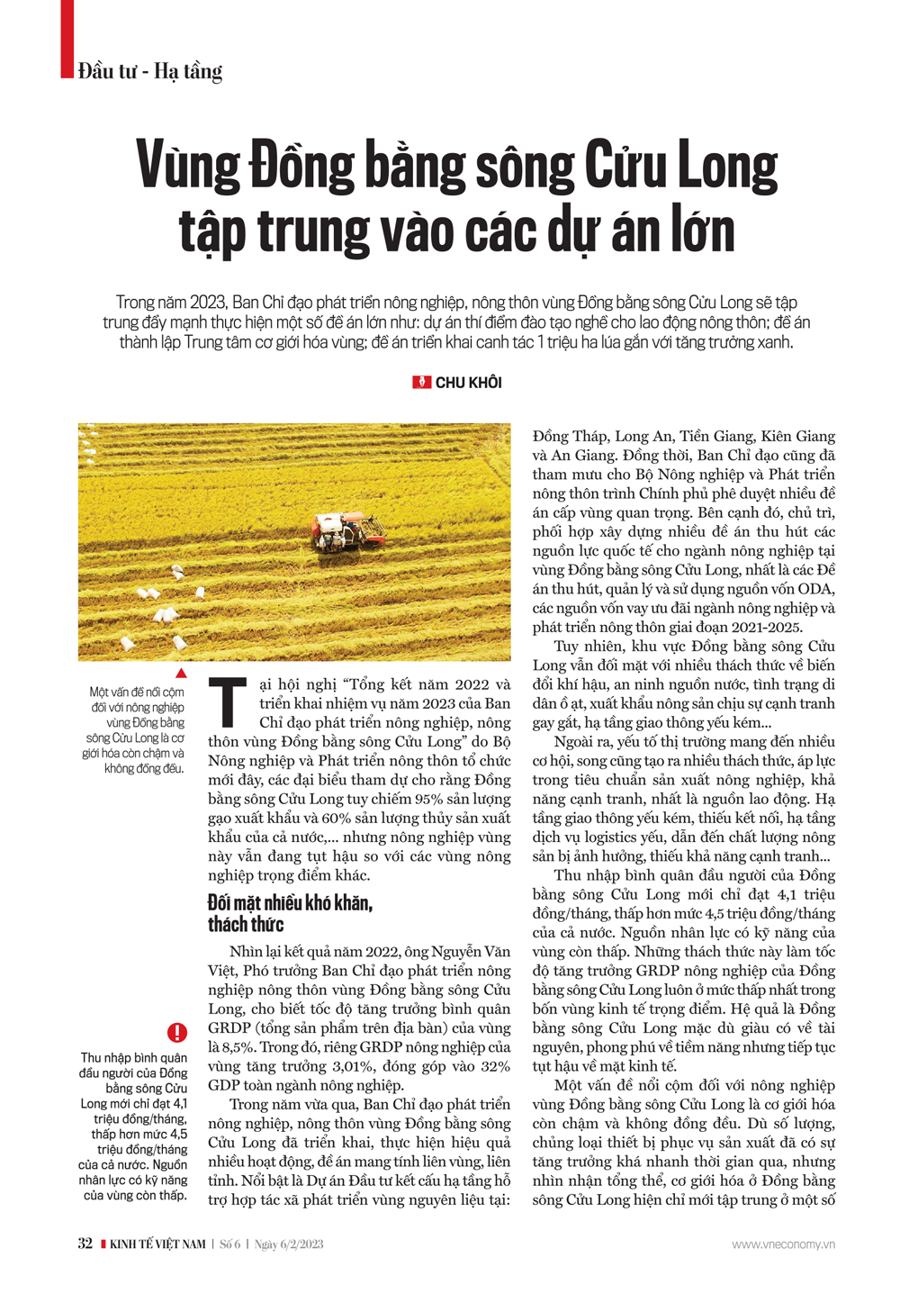[ad_1]
At the conference “Summing up 2022 and Implementing Tasks in 2023 of the Steering Committee for Agriculture and Rural Development in the Mekong Delta” recently held by the Ministry of Agriculture and Rural Development, the delegates of the participants said that while the Mekong Delta is 95% of rice exports and 60% of the country’s seafood exports,… but agriculture in this region still lags behind major agricultural regions.
Faced with many difficulties and challenges
Looking back at the results in 2022, Mr. Nguyen Van Viet, deputy head of the Mekong Delta Agriculture and Rural Development Steering Committee, said the region’s average GRDP (Gross Domestic Product) growth rate is 8.5%. The agricultural GDP of the region alone grew by 3.01% and contributed 32% to the agricultural GDP.
In the past year, the Mekong Delta Agriculture and Rural Development Steering Committee has implemented and successfully implemented many inter-regional and inter-provincial projects and activities. Outstanding is the infrastructure investment project to support cooperatives to develop resource areas in: Dong Thap, Long An, Tien Giang, Kien Giang and An Giang.
At the same time, the steering committee also advised the Ministry of Agriculture and Rural Development to submit many important regional projects to the government for approval. In addition, leading and coordinating the development of many projects to attract international resources to the agricultural sector in the Mekong Delta, in particular projects to attract, manage and utilize ODA capital, preferential loans for agriculture and rural development in the period 2021-2025.
However, the Mekong Delta region still faces many challenges related to climate change, water security, mass migration, fierce competition for agricultural exports and transport infrastructure.
In addition, the market factor brings many opportunities, but also creates many challenges and pressures in terms of agricultural production standards, competitiveness and especially the labor force. Poor transport infrastructure, lack of connectivity, weak logistics service infrastructure resulting in poor quality of agricultural products, lack of competitiveness…
Mekong Delta’s per capita income is only 4.1 million dongs/month, below the country’s 4.5 million dongs/month.
A prominent problem for agriculture in the Mekong Delta is slow and uneven mechanization. Although the number and type of equipment used in production has grown fairly rapidly in recent years, mechanization in the Mekong Delta in general is currently focused on just a few steps such as tilling the land, water, forage and some produce such as rice. Sugar cane, coffee, beef, poultry, fish, shrimp. Most machines and devices are mainly located at the household level with low capacity and lack of regional planning. Most agricultural machinery was not used effectively and at full capacity by farmers. Missing infrastructure for synchronizing mechanization, planning of fields, roads in production areas was not taken into account.
To solve the above challenges, Mr. Nguyen Van Viet said that in 2023, the Mekong Delta Agriculture and Rural Development Steering Committee will continue to advise, plan and implement a number of important projects for the region.
In particular: the project “Integrated Climate Resilience and Livelihood Transformation in the Mekong Delta for Sustainable Development and Prosperity” (WB11); Climate adaptation project in the Mekong Delta (MCRP) phase 2 funded by GIZ with a total funding of more than EUR 11 million (duration 2022-2025).
CONSTRUCTION AND DEVELOPMENT OF THE REGIONAL METHOD CENTER
On January 30, 2023, Deputy Minister of Agriculture and Rural Development Tran Thanh Nam had a meeting with the Board of Directors of Can Tho University for consultation on the construction and development of the regional mechanization center.
This center is designated by the Ministry of Agriculture and Rural Development as a non-commercial entity operating in the form of socialization rather than as a state administrative agency. The center has the involvement of 4 themes, including: State administrative bodies with the role of guiding mechanisms and guidelines; Colleges and universities, notably Can Tho University – the leading human resources training unit in the Mekong Delta; companies, cooperatives and banks.
According to the proposal of the Ministry of Economic Cooperation and Rural Development (Ministry of Agriculture and Rural Development), the Regional Mechanization Center will promote research and production of household machinery on the basis of cooperation with other countries, institutes, schools and enterprises to promote research and development, green innovation, technology transfer, education and training to improve professional skills at the service of mechanization. At the same time, consulting activities, application of machines, equipment and technology in production are offered; Supply of machines and equipment, technology and mechanization services, insurance and repair services.
The content of the article was published in Vietnam Economic Review No. 6-2023, issued on February 6, 2023. Welcome readers to read The:
https://postenp.phaha.vn/chi-tiet-toa-soan/tap-chi-king-te-viet-nam

[ad_2]
Source link

